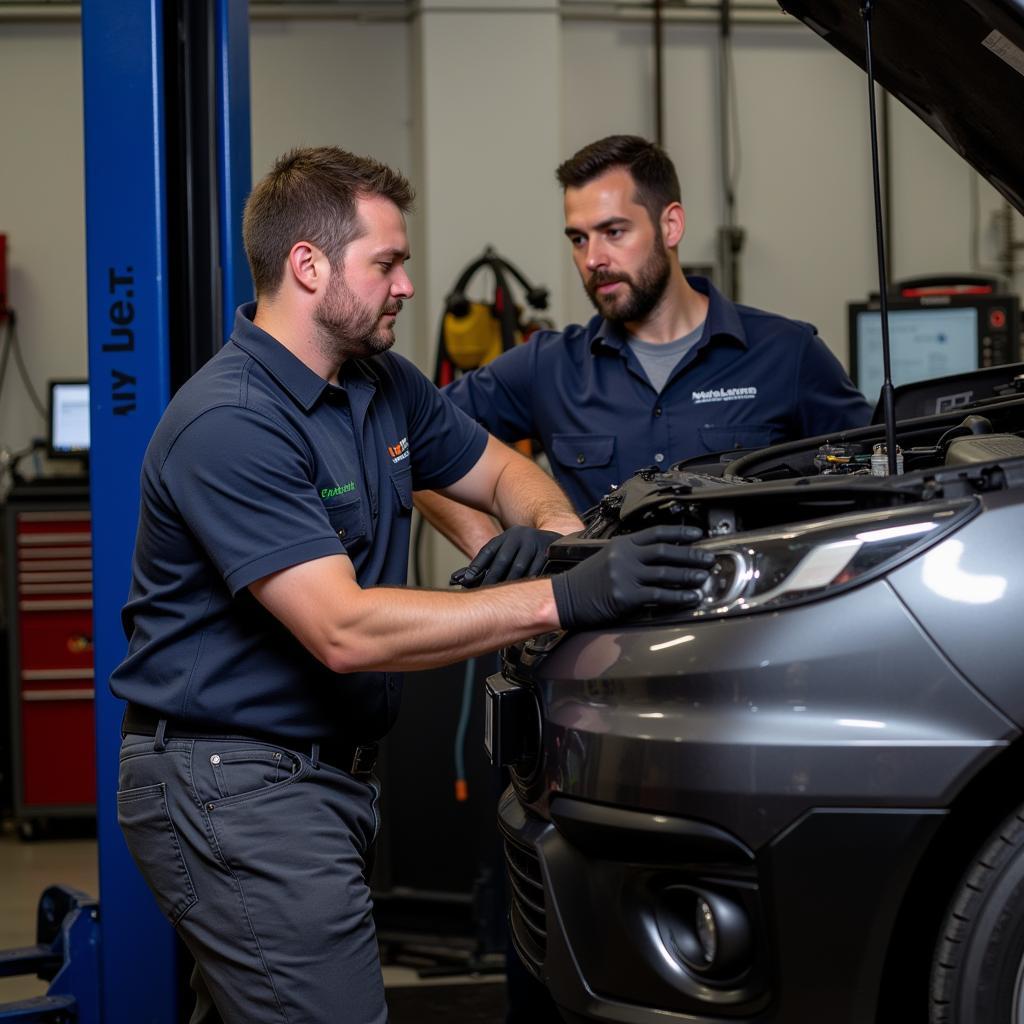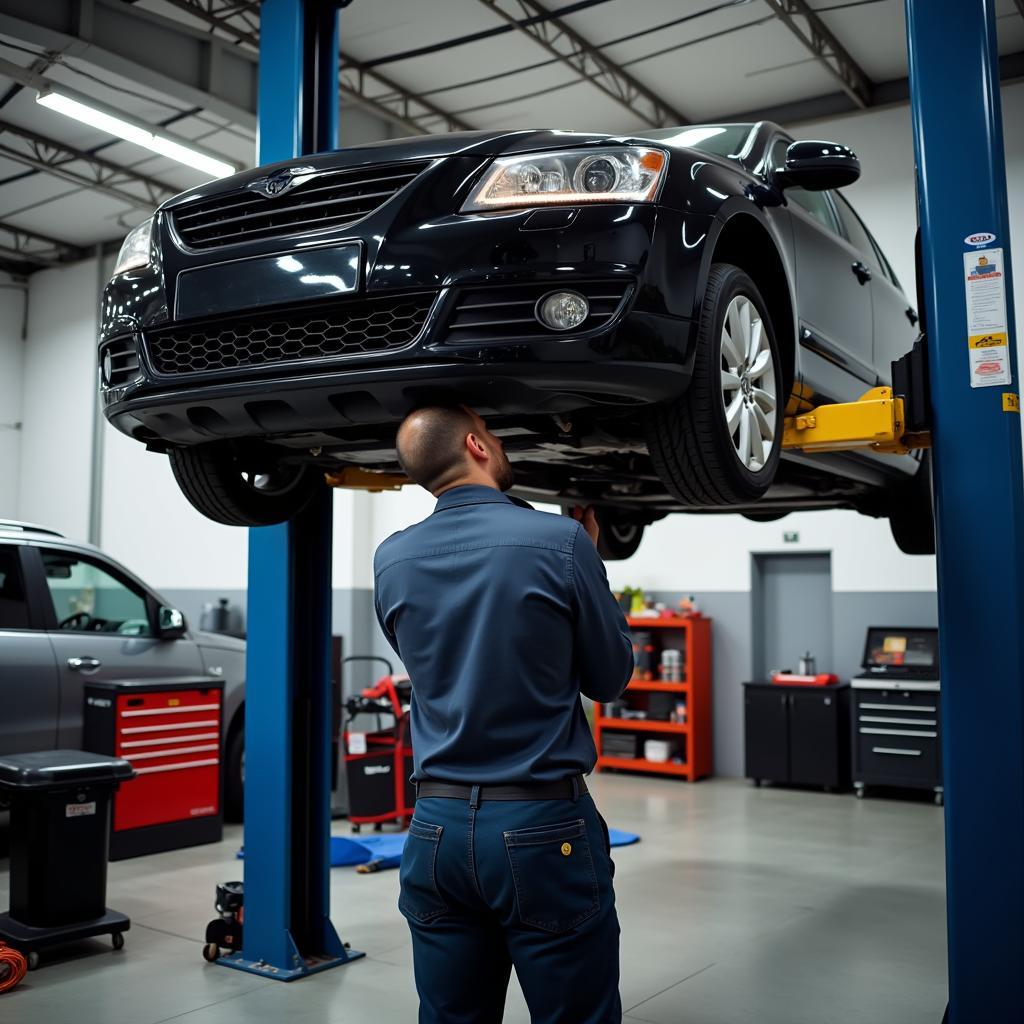Learning to fix cars can be a rewarding and empowering experience, saving you money and giving you a deeper understanding of your vehicle. Where To Learn To Fix Cars depends on your learning style, budget, and career aspirations. This guide will explore various options, from online courses to formal automotive programs, ensuring you find the perfect path to automotive mastery.
After identifying a specific car issue, understanding the underlying problem is crucial before attempting a fix. Accurate diagnosis often involves using specialized tools and a solid grasp of automotive systems. For a simple fix like How to fix cigarette lighter car fuse, you can often find quick online tutorials. Understanding the location and replacement procedure for a specific fuse type is essential to avoid further electrical issues.
Finding the Right Automotive Training Program
There are many avenues to pursue when looking to learn car repair, from DIY approaches to professional certifications. Choosing the right path depends on your goals and commitment level. Do you want to handle basic maintenance or become a skilled technician? Are you a hands-on learner or do you prefer structured classroom settings?
Vocational Schools and Community Colleges
These institutions offer structured automotive programs that provide a comprehensive foundation in car repair. They combine classroom instruction with hands-on experience in well-equipped shops. This is a great option for those seeking a formal education and potential career in the automotive industry.
Online Courses and Tutorials
Online resources offer a flexible and affordable way to learn at your own pace. Platforms like YouTube and dedicated automotive websites provide a wealth of information, from basic maintenance to complex repairs. This option is perfect for those who prefer visual learning and want to tackle specific projects. If you are interested in DIY car repair, learning How to learn to fix cars yourself is a great starting point.
Apprenticeship Programs
Apprenticeships combine on-the-job training with classroom instruction, providing a practical and immersive learning experience. You’ll work alongside experienced technicians, gaining valuable real-world skills and mentorship. This is an excellent pathway for those who learn best by doing.
 Apprentice mechanic working under the supervision of an experienced technician.
Apprentice mechanic working under the supervision of an experienced technician.
Specialized Training: Focusing Your Expertise
Once you have a general understanding of car repair, consider specializing in areas that pique your interest. This could include diagnostics, engine repair, or even bodywork. Specialized skills can increase your earning potential and job satisfaction. Do you ever wonder about Cyberpunk fixing car scenarios and what that future might hold? Futuristic repair techniques might be closer than you think.
Diagnostics and Electronic Systems
Modern cars are increasingly reliant on complex electronic systems. Learning to diagnose and repair these systems requires specialized training and tools. This is a growing field with high demand for skilled technicians.
Bodywork and Paint Repair
If you have an artistic flair and enjoy hands-on work, bodywork and paint repair could be a fulfilling career path. This involves repairing dents, scratches, and other damage to a car’s exterior, restoring it to its original condition. For minor damage, learning How to fix chipped paint on car can be a simple DIY project.
Essential Skills for Automotive Repair
Beyond technical knowledge, several essential skills are crucial for success in car repair.
- Problem-solving: Diagnosing car problems often requires critical thinking and the ability to analyze symptoms effectively.
- Attention to detail: Precision is paramount in car repair, as even small mistakes can have significant consequences.
- Manual dexterity: Working on cars requires good hand-eye coordination and the ability to manipulate tools in tight spaces.
Conclusion: Start Your Automotive Journey Today!
Whether you’re a car enthusiast looking to perform basic maintenance or aspiring to become a professional technician, numerous avenues exist to learn how to fix cars. From online tutorials to formal educational programs, the right path awaits. Don’t hesitate to explore your options and embark on a rewarding journey of automotive mastery. Contact AutoTipPro at +1 (641) 206-8880 or visit our office at 500 N St Mary’s St, San Antonio, TX 78205, United States for further assistance.
 Mechanic performing repairs on a car lifted on a hydraulic lift.
Mechanic performing repairs on a car lifted on a hydraulic lift.
If you are having trouble with your RC car, check out this article on how to fix a rc car remote.
FAQ
-
What is the quickest way to learn basic car repair? Online tutorials and DIY guides can provide a quick introduction to basic maintenance tasks.
-
How long does it take to become a certified automotive technician? Formal automotive programs typically take 2-4 years to complete.
-
Are online automotive courses as effective as in-person training? While online courses are valuable for theoretical knowledge, hands-on experience is crucial for developing practical skills.
-
What are the job prospects for automotive technicians? The demand for skilled automotive technicians is consistently high, offering stable career opportunities.
-
Do I need any prior experience to enroll in an automotive training program? Most programs welcome beginners with a passion for cars.
-
What are the essential tools for a beginner car mechanic? A basic set of hand tools, including wrenches, screwdrivers, and sockets, is a good starting point.
-
How can I stay updated on the latest automotive technologies? Continuing education courses and online resources are essential for staying current in this rapidly evolving field.







Leave a Reply